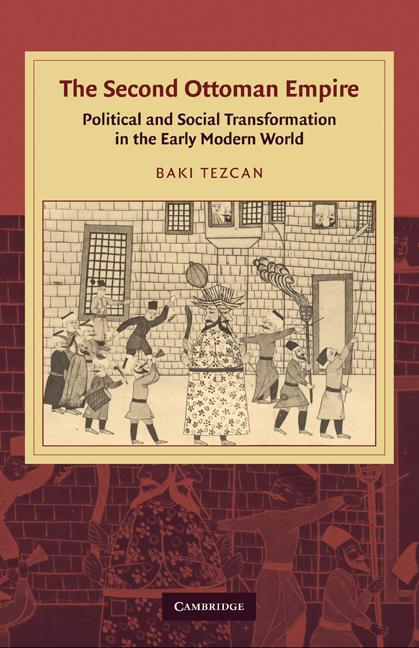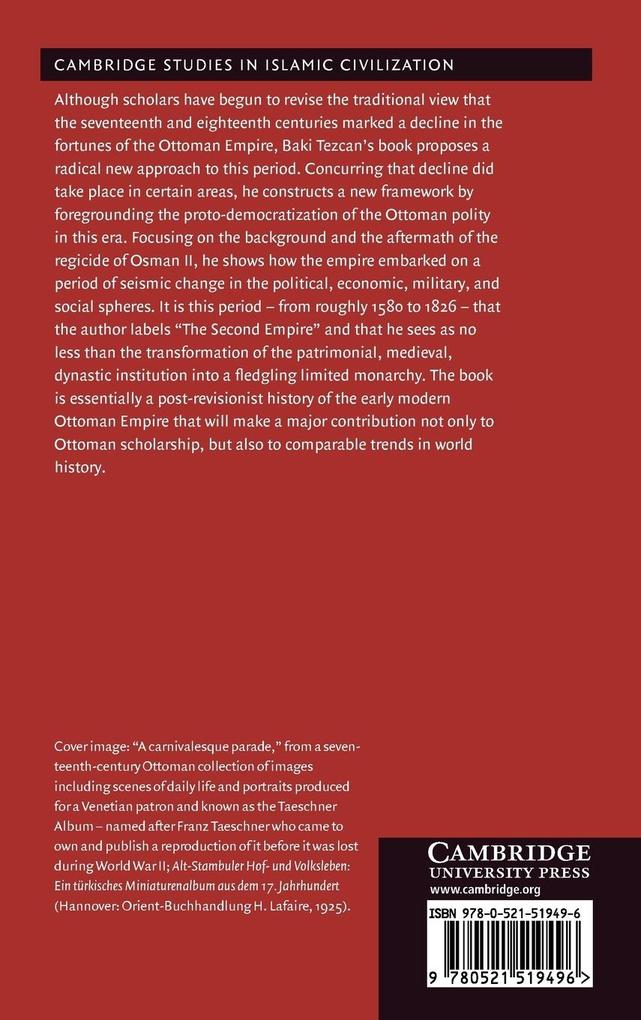
Zustellung: Sa, 19.07. - Mi, 23.07.
Versand in 7 Tagen
VersandkostenfreiBestellen & in Filiale abholen:
This book is a post-revisionist history of the late Ottoman Empire that will make a major contribution not only to Ottoman scholarship but also to comparable trends in world history.
Inhaltsverzeichnis
Introduction: Ottoman political history in the Early Modern period; 1. One market, one money, one law: the making of an imperial market society and a law that applies to all; 2. The question of succession: bringing the dynasty under legal supervision; 3. The court strikes back: the making of Ottoman absolutism; 4. A new empire for a second Osman: Osman II in power (1618-22); 5. The absolutist dispensation overturned: a regicide; 6. The second empire goes public: the age of the Janissaries; Conclusion: early modernity and the Ottoman decline.
Produktdetails
Erscheinungsdatum
01. September 2010
Sprache
englisch
Seitenanzahl
306
Autor/Autorin
Baki Tezcan
Verlag/Hersteller
Produktart
gebunden
Gewicht
596 g
Größe (L/B/H)
235/157/21 mm
ISBN
9780521519496
Entdecken Sie mehr
Pressestimmen
'This book is one of the most important to be published in Ottoman history for at least a decade, and engagement with its arguments will surely shape the field for many years to come. As with any book that offers such a bold, rich, and thorough reinterpretation, some readers will quibble over particular facets of its argument, and others will mistakenly dismiss the new framework out of hand. All of them, however, will have to contend with the force of its intervention and the elegance of the empirical craftsmanship that built it.' Alan Mikhail, Journal of Interdisciplinary History 'The Second Ottoman Empire contributes new content to early seventeenth-century Ottoman history, offers a new synthesis of recent analytical scholarship and tells Ottoman history from the seventeenth century in its own terms and as part of early modern global history. As such, it fills a significant void in the field of Ottoman studies. Future Ottoman scholarship will refer again and again to this important study.' Abdurrahman Atcil, New Middle Eastern Studies 'Tezcan ... has drawn on an admirable depth and breadth of original research to present a novel interpretation of Ottoman history in the troubled seventeenth century ... [T]he book has posed a serious challenge to currents in early modern global history that celebrate the economic power of China and other Asian empires while deliberately downplaying any discussion of democratic institutions or culture.' Sam White, Journal of Global History 'The work is based on the conviction that integrating economic, military, and social issues, often studied in isolation, would form a viable alternative political narrative of the Ottoman Empire. And, as [Tezcan] skilfully demonstrates, it does ... Tezcan's ... analytically solid argumentation utilizing a wide range of unpublished and published archival, manuscript, and literary sources open[s] up fresh research venues for Ottomanists and [is] a welcome contribution to the field.' Side Emre, Sixteenth Century Journal
Bewertungen
0 Bewertungen
Es wurden noch keine Bewertungen abgegeben. Schreiben Sie die erste Bewertung zu "The Second Ottoman Empire" und helfen Sie damit anderen bei der Kaufentscheidung.










